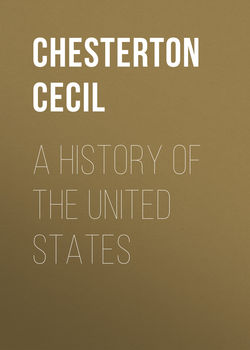A History of the United States

Реклама. ООО «ЛитРес», ИНН: 7719571260.
Оглавление
Chesterton Cecil. A History of the United States
CHAPTER I. THE ENGLISH COLONIES
CHAPTER II. ARMS AND THE RIGHTS OF MAN
CHAPTER III "WE, THE PEOPLE"
CHAPTER IV. THE MANTLE OF WASHINGTON
CHAPTER V. THE VIRGINIAN DYNASTY
CHAPTER VI. THE JACKSONIAN REVOLUTION
CHAPTER VII. THE SPOILS OF MEXICO
CHAPTER VIII. THE SLAVERY QUESTION
CHAPTER IX. SECESSION AND CIVIL WAR
CHAPTER X "THE BLACK TERROR"
CHAPTER XI. THE NEW PROBLEMS
Отрывок из книги
In the year of Our Lord 1492, thirty-nine years after the taking of Constantinople by the Turks and eighteen years after the establishment of Caxton's printing press, one Christopher Columbus, an Italian sailor, set sail from Spain with the laudable object of converting the Khan of Tartary to the Christian Faith, and on his way discovered the continent of America. The islands on which Columbus first landed and the adjacent stretch of mainland from Mexico to Patagonia which the Spaniards who followed him colonized lay outside the territory which is now known as the United States. Nevertheless the instinct of the American democracy has always looked back to him as a sort of ancestor, and popular American tradition conceives of him as in some shadowy fashion a founder. And that instinct and tradition, like most such national instincts and traditions, is sound.
In the epoch which most of us can remember pretty vividly – for it came to an abrupt end less than five years ago – when people were anxious to prove that everything important in human history had been done by "Teutons," there was a great effort to show that Columbus was not really the first European discoverer of America; that that honour belonged properly to certain Scandinavian sea-captains who at some time in the tenth or eleventh centuries paid a presumably piratical visit to the coast of Greenland. It may be so, but the incident is quite irrelevant. That one set of barbarians from the fjords of Norway came in their wanderings in contact with another set of barbarians living in the frozen lands north of Labrador is a fact, if it be a fact, of little or no historical import. The Vikings had no more to teach the Esquimaux than had the Esquimaux to teach the Vikings. Both were at that time outside the real civilization of Europe.
.....
We, therefore, the representatives of the United States of America in General Congress assembled, appealing to the Supreme Judge of the World for the rectitude of our intentions, do in the name and by the authority of the good people of these colonies, solemnly publish and declare that these United Colonies are and of right ought to be Free and Independent States.
The first principles set out in the Declaration must be rightly grasped if American history is understood, for indeed the story of America is merely the story of the working out of those principles. Briefly the theses are two: first, that men are of right equal, and secondly, that the moral basis of the relations between governors and governed is contractual. Both doctrines have in this age had to stand the fire of criticisms almost too puerile to be noticed. It is gravely pointed out that men are of different heights and weights, that they vary in muscular power and mental cultivation – as if either Rousseau or Jefferson was likely to have failed to notice this occult fact! Similarly the doctrine of the contractual basis of society is met by a demand for the production of a signed, sealed, and delivered contract, or at least for evidence that such a contract was ever made. But Rousseau says – with a good sense and modesty which dealers in "prehistoric" history would do well to copy – that he does not know how government in fact arose. Nor does anyone else. What he maintains is that the moral sanction of government is contractual, or, as Jefferson puts it, that government "derives its just powers from the consent of the governed."
.....